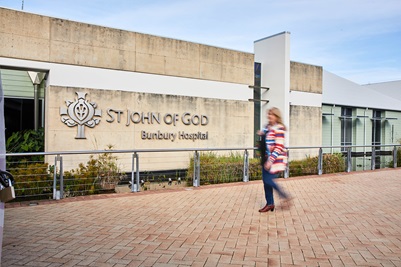2024 | Volume 25 | Issue 1

On any busy day in a rural hospital of St John of God in Bunbury, Western Australia the floor is a buzz of activity with the entire workforce on their feet. Among them are the surgical and medical registrars who are part of a cohort of 39 across the St John of God Healthcare Group and funded by the Specialist Training Program (STP). The program is an initiative of the Australian Department of Health and Aged Care to support training positions in rural areas and private facilities.
St John of God has been a long-time participant of the STP where the RACS program supports six surgical Trainees at the Bunbury (Western Australia), Geelong (Victoria) and Hawkesbury (New South Wales) locations. The STP fund allows Trainees to gain a wide range of experiences and learning opportunities supported by their individual hospitals. Claire Kane, Doctors Training Program administration officer, highlights the positive feedback from the Trainees. She says, “They appreciate the type and volume of experience they receive while on rotation.”
In growing the medical workforce in Australia, St John of God Health Care considers the STP as a valuable tool in making this happen. Dr Luis Prado, Chief Medical Officer, explains that the training opportunities the program brings is making a significant difference. “If you do not include STP in public and in private hospitals, the training opportunities are dramatically reduced,” he says.
The STP has also helped St John of God in meeting their commitment to educate the next generation of medical specialists. Dr Prado explains that having the culture, capacity, and strategy to deliver training are key aspects in providing a unique experience for the Trainees in a supportive and positive environment. “The clinical one-on-one interaction with the specialist means they are training on the run, all the time, every day,” Dr Prado says. This environment becomes attractive for Trainees to come back to St John of God as Fellows.
The STP’s impact on the hospital has also been valuable for the patients and the workforce. Dr Prado says that patients feel comfortable when registrars talk to them about complications and managing care. Even the nursing staff appreciate working with the junior doctors, noting that having the STP registrars around sets a different tone and manner of engagement with the doctors and suggesting that it is a good combination for providing better care to patients.
In addition to educating the future medical specialists, St John of God leverages the STP to provide healthcare with a community lens and encourages those who are interested in becoming rural surgeons to pursue this funded training opportunity.
“If it’s in your mission and purpose then you should be looking at contributing to that space by leveraging the STP program,” Dr Prado says. Claire Kane also acknowledges that the program has allowed a significant improvement in service in both emergency and elective surgery regardless of location—rural or metro.
Looking to the future, St John of God intends to continue developing the next generation of health care professionals with the help of the STP program. For surgical Trainees, they have found that direct modelling of performance is effective in teaching how they are meant to perform as surgeons. “We hope that the model works for them and that later they give back and pay it forward,” Dr Prado says. Ms Kane adds that the program funding also improves St John of God's ability to attract and retain Fellows with different specialisations and this will further strengthen the hospital’s continuing accreditation and training capacity.
St John of God also realises that looking after the wellbeing of their workforce is as important as developing their skills. This was true especially post COVID-19 where the hospital found that the Trainees and their supervisors were revisiting their priorities. “We’ve noticed that they are putting family, wellbeing and health higher up their list,” Dr Prado says. Ultimately, looking after the welfare of the hospital’s workforce will continue to be a strategy that will complement St John of God’s commitment to education and to the community with STP support.
For more information about STP funding opportunities, email the STP team on: stp.admin@surgeons.org or visit the STP page on the RACS website.
___________________________________
The Specialist Training Program (STP) is an initiative funded by the Australian Department of Health and Aged Care enabling specialist registrars to pursue training outside traditional metropolitan teaching hospitals. STP funding contributes to Trainees’ salary, infrastructure, and supervision support for private facilities as well as an allowance for rural settings to fund activities including surgical outreach.